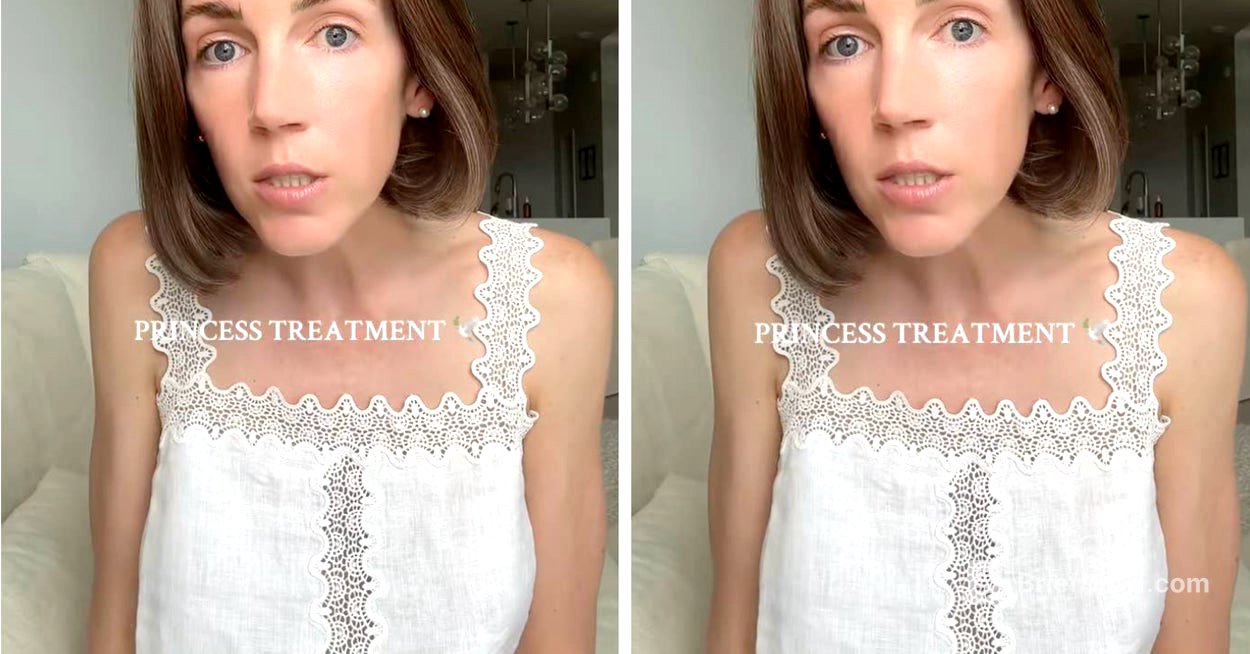TLDR;
This article discusses the viral "princess treatment" dating trend, where women showcase romantic gestures from their partners. It highlights a specific creator, Courtney Palmer, whose extreme version of the trend has sparked controversy. Experts weigh in on the potential dangers of this trend, including the reinforcement of traditional gender roles, power imbalances, and unrealistic expectations in relationships. The article also explores whether this trend is simply a public display of kink and offers advice on how to make such dynamics healthy, emphasizing mutual respect, effort, and communication.
- The "princess treatment" trend involves women showcasing romantic gestures from partners.
- Courtney Palmer's extreme version, where she doesn't tie her shoes or speak to waitstaff, has drawn criticism.
- Experts warn about the reinforcement of traditional gender roles and power imbalances.
- The trend may be a form of escapism from the responsibilities of modern life.
- Healthy relationships require mutual respect, effort, and communication, not one-sided service.
The "Princess Treatment" TikTok Trend
The "princess treatment" dating trend has gained popularity on TikTok, with women sharing romantic gestures from their partners, such as flowers, home-cooked meals, and acts of chivalry. Recently, Courtney Palmer, known as @courtney_joelle, has stirred controversy with her extreme version of the trend, claiming she doesn't tie her shoelaces or speak to waitstaff, all in the name of being more "feminine" and allowing her husband to be more "masculine." This has led to strong reactions online, with some users comparing it to a "cult or hostage situation" and criticizing it as rude and reminiscent of "The Handmaid's Tale."
Bringing Back Chivalry — Or Rebranding Aspirational Helplessness?
While some appreciate the traditional courtship aspect of the "princess treatment," experts warn that it can quickly turn into something darker, similar to the #girlboss trend. Genesis Games, a therapist and relationship expert, emphasizes the difference between expressing reasonable expectations and making oneself small and helpless. Blaine Anderson, a matchmaker and dating coach, acknowledges that such dynamics can work if mutually agreed upon, but Games points out that Palmer's approach relies on heavily "scripted" gender roles derived from patriarchal norms, which can be harmful if they are too rigid and leave no room for flexibility.
The Problem with Power Imbalances
Sabrina Zohar, a dating coach, criticizes the patriarchal values inherent in the "princess treatment" trend, arguing that it equates to aspiring to powerlessness. She views it as a form of escapism from the responsibilities of modern life, where people seek to opt out of their own lives rather than addressing the reasons for their burnout. Zohar emphasizes that the trend is based on an unbalanced dynamic where one partner anticipates needs while the other remains passive, which is unsustainable and unfulfilling. She advocates for mutual respect and effort in relationships, rather than one-sided service.
Unrealistic Expectations and Financial Realities
Games suggests that many creators promoting the "princess treatment" live in wealthier circumstances, leading young women to believe that men should be able to afford expensive beauty routines, dinners, and designer bags. This skews perceptions of dating and marriage, potentially causing young men to feel unworthy if they cannot meet these financial expectations and young women to overlook compatible partners who cannot provide such luxuries.
...And Are We Sure This Isn’t Just A Public Display Of Kink?
While some have likened Palmer's version of the princess treatment to a dominant/submissive kink, experts argue that this is a reductive interpretation. Games notes that people don't live their entire lives in kink mode and that engaging in submissive behaviors occasionally is different from living in a highly scripted, one-sided dynamic daily. Anderson points out that women demanding princess treatment are actually setting the tone in their relationships, which is a dominant posture. Zohar emphasizes that genuine D/s dynamics involve explicit negotiation, clear boundaries, and consent, which are lacking in the princess treatment trend, where unequal power structures are unconsciously recreated and called romance.
Can ‘Princess Treatment’ Ever Really Be Healthy?
Zohar believes that the "princess treatment" dynamic can never be truly healthy, as it lacks reciprocal care. She suggests that healthy relationships involve both partners making each other feel valued through their actions, both giving and receiving. Games advises sharing small gestures that are meaningful to you with your partner, considering their feasibility and frequency, and being curious about what makes your partner feel special. Ultimately, it's about finding the right balance and avoiding extremes where women are encouraged to make themselves small in the presence of men. The goal should be for women to show up as their full, authentic selves without emasculating men.



![[Movie Recap] Top Assassin Seeks Revenge on the Boss Who Betrayed Him](https://wm-img.halpindev.com/p-briefread_c-10_b-10/urlb/aHR0cDovL2ltZy55b3V0dWJlLmNvbS92aS9ET0tVSDhwZ09NWS9ocWRlZmF1bHQuanBn.jpg)





